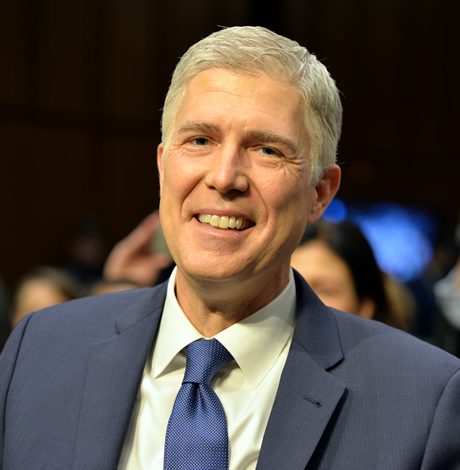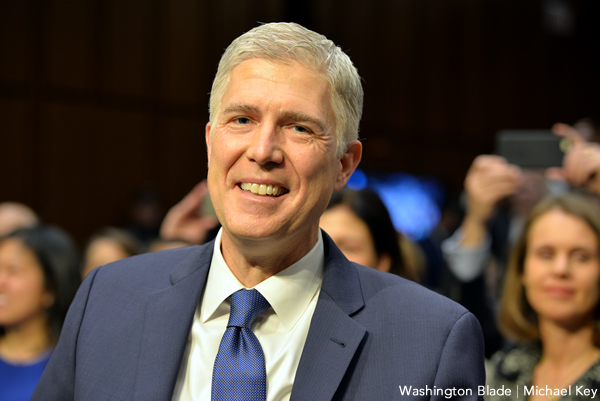News
Gorsuch confirmed to the dismay of LGBT rights supporters
Senate approves new justice after nuking filibuster


The U.S. Senate confirmed Neil Gorsuch to the U.S. Supreme Court.
(Washington Blade photo by Michael Key)
The U.S. Senate confirmed on Friday Neil Gorsuch to the U.S. Supreme Court much to the dismay of LGBT rights supporters who think he’ll oppose LGBT rights and Democrats who say the seat was unfairly awarded to him.
The Senate confirmed him to the seat by a largely party-line vote of 54-45, although Sens. Joe Manchin (D-W.Va.), Joe Donnelly (D-Ind.) and Heidi Heitkamp (D-N.D.) joined Republicans to confirm the nominee. Sen. Johnny Isakson (R-Ga.), who’s recovering from back surgery, missed the vote.
Russell Roybal, deputy executive director for the National LGBTQ Task Force, said in a statement the confirmation amounts to “the triumph of bullying over moderation.”
“Taking their lead from the Bully-in-Chief Donald Trump, Mitch McConnell twisted and turned the rules of the Senate to ram this extremist nominee through — slashing and burning safeguards for moderation, such as the rule calling for a 60 votes threshold needed to confirm an Associate Supreme Court Justice,” Roybal said. “We now have a new Justice who is so conservative that he makes Antonin Scalia look moderate,”
The Gorsuch confirmation is a win for President Trump after a first 100 days in office marked by questions about his presidential campaign’s relationship with Russia, the failure of legislation he endorsed to repeal Obamacare and national security challenges in Syria and North Korea.
But Democrats put up a fight in the road to confirmation, citing Senate Republicans’ unwillingness to even hold a hearing for President Obama’s choice for the seat — U.S. Circuit Judge Merrick Garland — when it was first made open by the death of the U.S. Associate Justice Antonin Scalia last year.
Democrats on Thursday successfully filibustered by the nomination after speaking out on the Senate floor against Gorsuch on the Senate. Sen. Jeff Merkley (D-Ore.), who said he’d filibuster any nominee other than Garland, spoke for 15 hours on the Senate floor against Trump’s nominee.
In the end, Senate Majority Leader Mitch McConnell (R-Ky.) was able to move forward by changing the rules and exercising the “nuclear option,” which ended the ability for senators to filibuster nominees to the Supreme Court. McConnell cited as precedent for this action former Senate Democratic Leader Harry Reid ending the filibuster in 2013 for administrative appointments and lower court judicial nominees.
Commending McConnell for his actions to ensure the confirmation of Gorsuch was Tony Perkins, president of the anti-LGBT Family Research Council.
“Leader McConnell is to be commended for holding fast to historical precedent of not allowing an outgoing president to pack the Court with ideological jurists on his way out of the White House,” Perkins said. “The Supreme Court vacancy after the death of Justice Scalia became a defining issue of the 2016 presidential election. President Trump made history by telling voters who he would appoint to the Court by providing a list — the American people chose him and he in turn chose from the list, keeping his promise.”
LGBT rights supporters have expressed concerns about Gorsuch largely because of his record as a judge on the U.S. 11th Circuit Court of Appeals.
Chief among those concerns is a ruling the Hobby Lobby case in which he determined the retail chain should afforded “religious freedom” despite requirements under Obamacare to deny contraceptive coverage for female employees. Many LGBT rights supporters say that could be a prelude to Gorsuch being willing to institute “religious freedom” carve-outs in LGBT non-discrimination laws.
Other LGBT criticism over Gorsuch relates to his decisions on transgender rights. In 2015, Gorsuch joined an 11th Circuit decision against a transgender inmate who alleged she was denied transition-related hormone therapy and unfairly housed in an all-male facility. In 2009, Gorsuch also joined an unpublished opinion finding the provision against sex discrimination under Title VII of the Civil Rights Act of 1964 doesn’t apply to transgender people.
In a 2005 op-ed for the National Review “Liberals & Lawsuits,” Gorsuch excoriated the progressive movement for seeking advancements in the courts, identifying same-sex marriage an issue that should be decided elsewhere a decade before the Supreme Court would rule for marriage equality nationwide.
Sarah Kate Ellis, CEO of GLAAD, condemned Senate Republicans for the confirmation of Gorsuch in a statement based on his anti-LGBT rulings and writings.
“Republicans in the Senate just destroyed a steadfast American tradition for the purpose of confirming a person to the U.S. Supreme Court who will most certainly vote in opposition to the safety and well-being of the LGBTQ community and many marginalized groups for his entire career on the bench,” Ellis said. “With his history of siding against transgender Americans and arguing against marriage equality, Neil Gorsuch is yet another reprehensible pawn in the Trump Administration’s goal of erasing the LGBTQ community from the fabric of America.”
During his confirmation hearing, Gorsuch said the U.S. Supreme Court ruling in favor of same-sex marriage is “settled law,” but added “there is ongoing litigation about its impact and application right now,” suggesting he thinks limitations to the ruling are still on the table. According to the Human Rights Campaign, Gorsuch also refused to answer in response to written questions from the Senate whether he thinks LGBT people are eligible for protections under current federal civil rights laws.
Stan Sloan, CEO of the Family Equality Council, said in a statement he hopes concerns about Gorsuch’s views on legal protections for LGBT people prove incorrect now that the jurist has been confirmed to the Supreme Court.
“Family Equality Council opposed the confirmation of Neil Gorsuch to the Supreme Court, and we are disappointed that this confirmation is now a reality,” Sloan said. “We hope that our fears concerning his ability to assure fair treatment of LGBTQ individuals and families — and members of all marginalized communities — will now be proven wrong, and that Justice Gorsuch rises to support and protect the civil liberties of all Americans.”

The Mexican Senate on Thursday approved a bill that would ban so-called conversion therapy in the country.
Yaaj México, a Mexican LGBTQ rights group, on X noted the measure passed by a 77-4 vote margin with 15 abstentions. The Chamber of Deputies, the lower house of Mexico’s congress, approved the bill last month that, among other things, would subject conversion therapy practitioners to between two and six years in prison and fines.
The Senate on its X account described conversion therapy as “practices that have incentivized the violation of human rights of the LGBTTTIQ+ community.”
“The Senate moved (to) sanction therapies that impede or annul a person’s orientation or gender identity,” it said. “There are aggravating factors when the practices are done to minors, older adults and people with disabilities.”
Mexico City and the states of Oaxaca, Quintana Roo, Jalisco and Sonora are among the Mexican jurisdictions that have banned the discredited practice.
The Senate in 2022 passed a conversion therapy ban bill, but the House of Deputies did not approve it. It is not immediately clear whether President Andrés Manuel López Obrador supports the ban.
Canada, Brazil, Belgium, Germany, France, and New Zealand are among the countries that ban conversion therapy. Virginia, California, and D.C. are among the U.S. jurisdictions that prohibit the practice for minors.
The White House
Four states to ignore new Title IX rules protecting transgender students
Biden administration last Friday released final regulations

BY ERIN REED | Last Friday, the Biden administration released its final Title IX rules, which include protections for LGBTQ students by clarifying that Title IX forbids discrimination based on sexual orientation and gender identity.
The rule change could have a significant impact as it would supersede bathroom bans and other discriminatory policies that have become increasingly common in Republican states within the U.S.
As of Thursday morning, however, officials in at least four states — Oklahoma, Louisiana, Florida, and South Carolina — have directed schools to ignore the regulations, potentially setting up a federal showdown that may ultimately end up in a protracted court battle in the lead-up to the 2024 elections.
Louisiana State Superintendent of Education Cade Brumley was the first to respond, decrying the fact that the new Title IX regulations could block teachers and other students from exercising what has been dubbed by some a “right to bully” transgender students by using their old names and pronouns intentionally.
Asserting that Title IX law does not protect trans and queer students, Brumley states that schools “should not alter policies or procedures at this time.” Critically, several courts have ruled that trans and queer students are protected by Title IX, including the 4th U.S. Circuit Court of Appeals in a recent case in West Virginia.
In South Carolina, Schools Supt. Ellen Weaver wrote in a letter that providing protections for trans and LGBTQ students under Title IX “would rescind 50 years of progress and equality of opportunity by putting girls and women at a disadvantage in the educational arena,” apparently leaving trans kids out of her definition of those who deserve progress and equality of opportunity.
She then directed schools to ignore the new directive while waiting for court challenges. While South Carolina does not have a bathroom ban or statewide “Don’t Say Gay or Trans” law, such bills continue to be proposed in the state.
Responding to the South Carolina letter, Chase Glenn of Alliance For Full Acceptance stated, “While Supt. Weaver may not personally support the rights of LGBTQ+ students, she has the responsibility as the top school leader in our state to ensure that all students have equal rights and protections, and a safe place to learn and be themselves. The flagrant disregard shown for the Title IX rule tells me that our superintendent unfortunately does not have the best interests of all students in mind.”
Florida Education Commissioner Manny Diaz also joined in instructing schools not to implement Title IX regulations. In a letter issued to area schools, Diaz stated that the new Title IX regulations were tantamount to “gaslighting the country into believing that biological sex no longer has any meaning.”
Governor Ron DeSantis approved of the letter and stated that Florida “will not comply.” Florida has notably been the site of some of the most viciously anti-queer and anti-trans legislation in recent history, including a “Don’t Say Gay or Trans” law that was used to force a trans female teacher to go by “Mr.”
State Education Supt. Ryan Walters of Oklahoma was the latest to echo similar sentiments. Walters has recently appointed the right-wing media figure Chaya Raichik of Libs of TikTok to an advisory role “to improve school safety,” and notably, Raichik has posed proudly with papers accusing her of instigating bomb threats with her incendiary posts about LGBTQ people in classrooms.
The Title IX policies have been universally applauded by large LGBTQ rights organizations in the U.S. Lambda Legal, a key figure in fighting anti-LGBTQ legislation nationwide, said that the regulations “clearly cover LGBTQ+ students, as well as survivors and pregnant and parenting students across race and gender identity.” The Human Rights Campaign also praised the rule, stating, “rule will be life-changing for so many LGBTQ+ youth and help ensure LGBTQ+ students can receive the same educational experience as their peers: Going to dances, safely using the restroom, and writing stories that tell the truth about their own lives.”
The rule is slated to go into effect Aug. 1, pending any legal challenges.
****************************************************************************

Erin Reed is a transgender woman (she/her pronouns) and researcher who tracks anti-LGBTQ+ legislation around the world and helps people become better advocates for their queer family, friends, colleagues, and community. Reed also is a social media consultant and public speaker.
******************************************************************************************
The preceding article was first published at Erin In The Morning and is republished with permission.
South America
Argentina government dismisses transgender public sector employees
Country’s Trans Labor Quota Law enacted in 2021

Protests have broken out across Argentina in recent weeks after the dismissal of transgender people from their government jobs.
President Javier Milei’s action is in stark contract with the progress seen in 2023, where the government’s hiring of trans people increased by 900 percent within the framework of the Trans Labor Quota Law that had been in place since 2021.
Among those affected is Sofia Diaz, a “survivor” who shared her testimony with the Washington Blade hours after she traveled from Chaco Province to Buenos Aires to protest her dismissal.
Presentes, an LGBTQ news agency, reported the government dismissed more than 85 trans employees in less than two weeks.
Diaz, 49, holds a degree in combined arts. She joined the National Social Security Administration (ANSES) in 2022 under the Trans Labor Inclusion Law. The layoffs began in January and left many people feeling uncertain and anguished. It was her turn a few days ago.
Diaz in an interview recounted how the situation became progressively more complicated, with difficulties in accessing information about her employment status and the eventual confirmation of dismissals through WhatsApp messages. This government action, according to Diaz, violates the law.
“We were on a Friday, I think on March 24, in the office and we have a WhatsApp group of other colleagues from all over Argentina who entered through the trans labor quota and they tell us if we can get our pay stubs on the intranet,” Diaz recalled. “So, I tried to enter, I could not, I talked to two other colleagues and they told me no, they could not, and so we went to another person. He couldn’t either.”
“Some people told us that it could be a system error. Well, we were never calm, let’s say not how this issue of installing fear and the perversion with which they do it ends,” she added. “This sadism of … inflicting pain and speculating with your misfortune and so on … is something that characterizes Javier Milei’s government.”
Diaz recalled a list of those dismissed from the agency began to circulate from the union in the afternoon. A colleague passed it on to her, “and well, unfortunately I was also on that list.”
“At that moment the whole weekend went by with anguish, crying, and talking with other colleagues from other places, not only trans, but everyone, everyone and everyone,” she said. “On Monday when we went to try to enter, we could not enter with the biometric, which is the thumb we had to use every morning to enter.”
Despite the difficult moment through which she is going, the trans activist stressed to the Blade that she will continue protesting and will even sue the government because her dismissal is illegal and “violates the constitution itself.”
The LGBTQ community and its allies have mobilized and organized demonstrations, highlighting the importance of defending the rights won and fighting against discrimination and exclusion. Diaz emphasized the fight is not only for the people affected today, but also for future generations, saying the historical memory of the struggles for inclusion and social justice must be kept alive.
“The Argentine government thus faces a key challenge in human and labor rights, where public pressure and social mobilization can play a determining role in protecting the rights of LGBTQ+ people,” Diaz said.
-

 State Department3 days ago
State Department3 days agoState Department releases annual human rights report
-

 Maryland5 days ago
Maryland5 days agoJoe Vogel campaign holds ‘Big Gay Canvass Kickoff’
-

 Politics4 days ago
Politics4 days agoSmithsonian staff concerned about future of LGBTQ programming amid GOP scrutiny
-

 District of Columbia1 day ago
District of Columbia1 day agoCatching up with the asexuals and aromantics of D.C.












